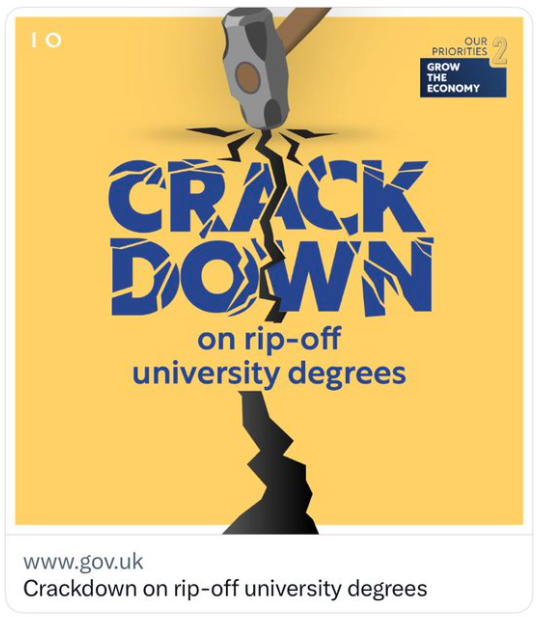Under the last Conservative government universities saw some of the greatest damage to their reputation ever witnessed.
While it might not be clear exactly what modern-day universities did to deserve such unbridled animosity, it’s clear we were ineffective in preventing it take root.
The epitome of the confected disgust displayed towards higher education peaked when in July 2023 Rishi Sunak and Number 10 released a jolly yellow and blue hammer graphic pledging to “crack-down on rip off university degrees”.

It’s important that, early in the life of this new government, universities make a better case for themselves. The tide of public opinion was clear in late July when The Times published their lead article “Universities face cash ‘catastrophe’ with threat of mergers and course cuts”. The readers’ comments posted underneath showed little sympathy with a barrage of comments on there being too many universities, providing little benefit to people who studied there.
Local benefits
Focusing on local benefit provides the key to universities presenting a stronger argument for their worth. This plays directly to the new government’s agenda. While many parts of the King’s Speech saw Labour trying, understandably, to take back central control of areas like energy and rail travel, in other measures they spoke of more local power.
The devolution bill was not exactly a surprise but it was in many ways the biggest signal that we very much have a new government, that we are seeing the change which Keir Starmer has placed at the heart of his party’s messaging.
Under the plans, local areas would get more control over strategic planning, local transport networks, and skills and employment support. The legislation also introduces new duties for local leaders to produce growth plans. It is a recognition by the government that each region of the country is different and needs to be able to gear its own development to match its needs.
As the Deputy Prime Minister, Angela Rayner, said:
For too long, Westminster government has tightly gripped control and held back opportunities and potential for towns, cities, and villages across the country.
Devolved higher education?
One area which still sits firmly in that same Westminster grip is higher education. The Conservative government spent an astonishing amount of money and energy tightening restrictions around what universities were doing and how they did it, setting targets and benchmarks from London, applying them to the country as a whole.
A good example of this is the Graduate Outcome data, measured 15 months after graduation. The results are presented as a national way of judging the outcome of a programme, without any consideration of the prevalent socio-economic content or workforce and skills needs of a place.
Yet those key regional factors are essential. Leicester – where De Montfort University, where I work, is based – is one of only two cities in the country where children on free school meals are now less likely to go to university than they were a decade ago. According to a deprivation indices study completed in 2019, 43 per cent of under 16s in Leicester live in the most deprived 20 per cent of areas nationally. Should resultant salaries for graduates in Leicester be measured in the same way as London?
We are, primarily, a local educator. Despite the previous government and media desire to put students off attending university, just under 50 per cent of all the students DMU accepts each year live in the East Midlands. We take young people from schools and colleges across the East Midlands and we give them confidence and skills to make a career.
Still work to do on participation
A new report, by London Economics, showed that three years after graduating, 51 per cent of DMU graduates remain in the East Midlands and that those who do so are earning around a third more than people who choose not to go to university at all. An uplift in salary was evident for students no matter what they studied.
An understanding of the local context is crucial in showing that far from “rip off” degrees, they are providing local opportunity for communities often most at need of a chance.
Many universities can make similar claims about the impact they have on their local areas. And yet, because of national comparisons, which do not take into account any of this regional variation and nuance, they, like DMU, would be classed as offering the young people who very much need opportunity a “low value” education.
Earlier this year Neon, a University of West London based organisation supporting widening access to higher education, published research which showed that some children with free school meals (FSM) backgrounds are five times more likely to end up in university than others, depending on where they live.
It found that in 2021-22 66 per cent of state-funded pupils from an FSM background in Westminster progress to higher education. By contrast, in most areas in England if you are a state school pupil in receipt of FSM you have less than a 25 per cent chance of going onto higher education by age 19. Worse still, UCAS’s 30 June deadline data of 2024 entrants showed the gap between the most and least deprived student applications remains unchanged since 2015 at 30.6 per cent.
A diverse sector for a diverse country
For more than a decade, universities have been increasingly challenged to conform to a definition which cannot fit them all, then attacked for failing to meet such inflexible standards. But it is clear that despite this, they remain our country’s most productive engines for growth.
With a new government in place, one which has placed regional autonomy at the centre of its plans, there is an opportunity to change the way our sector is seen and valued. Labour has said it wants to govern through partnership and will find no partner more willing to partner than higher education.
Moreover, any review of universities should seek to address this issue of locality and consider how a system can support and reward local skills delivery which benefits areas which are desperately in need.














I think it’s really heartening to see a Vice Chancellor stand up for the sector, but I would contend that right now, there’s bigger fish to fry. There’s no one left to pass the buck onto, no sector-wide cohesion, and peddling Universities as “productive engines for growth” means nothing to prospective students, nor does it mean anything to the local citizens who depend on sound governance decisions being made by their employers in times of crisis. Time to put down the fiddle and get to work protecting the jobs in the communities you supposedly have at heart. The previous government… Read more »
Katie Normington’s piece prompts two questions around ‘the local’. One is why HEIs were, in the day, so enthusiastic about emancipation from ‘local control’ of the polytechnics; loud were the voices decrying parochialism and the incapacity of councillors to manage such big beasts. The second, related, is what sort of role Katie and proponents of the new local envisage for elected local authorities in the financing and administration of HEIs. Councils insist on their legitimacy via elections. They run important services. Why should HE be excluded? The truth is vice chancellors would, still, strongly oppose giving councils any direct say.… Read more »